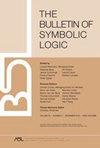使用几乎无处不在的定理从分析研究随机性
IF 1.1
3区 数学
Q1 LOGIC
引用次数: 18
摘要
我们通过分析和遍历理论中几乎无处不在的定理的有效版本来研究算法随机性概念。效率是通过可计算枚举集描述的对象来实现的,例如低级半可计算函数。相应的随机性概念略强于\ML (ML)随机性。我们建立了几个等价。给定一个ml随机实数$z$,下面需要的额外随机性强度是相等的。\n(1)所有包含$z$的有效封闭类的密度$1$为$z$。\n(2)一致左-c.e.的所有非降函数。增量在$z$上是可微的。\n (3) $z$是每一个下半可计算可积函数的勒贝格点。我们还考虑了左-c - e的收敛性。以及Birkhoff的逐点遍历定理意义上的收敛性。最后研究了$\Pi^0_n$和$\Sigma^1_1$类密度的随机性概念。本文章由计算机程序翻译,如有差异,请以英文原文为准。
Using Almost-everywhere theorems from Analysis to Study Randomness
We study algorithmic randomness notions via effective versions of almost-everywhere theorems from analysis and ergodic theory. The effectivization is in terms of objects described by a computably enumerable set, such as lower semicomputable functions. The corresponding randomness notions are slightly stronger than \ML\ (ML) randomness. We establish several equivalences. Given a ML-random real $z$, the additional randomness strengths needed for the following are equivalent.
\n (1) all effectively closed classes containing $z$ have density $1$ at $z$.
\n (2) all nondecreasing functions with uniformly left-c.e.\ increments are differentiable at $z$.
\n (3) $z$ is a Lebesgue point of each lower semicomputable integrable function.
We also consider convergence of left-c.e.\ martingales, and convergence in the sense of Birkhoff's pointwise ergodic theorem. Lastly we study randomness notions for density of $\Pi^0_n$ and $\Sigma^1_1$ classes.
求助全文
通过发布文献求助,成功后即可免费获取论文全文。
去求助
来源期刊
CiteScore
0.60
自引率
0.00%
发文量
32
审稿时长
>12 weeks
期刊介绍:
The Bulletin of Symbolic Logic was established in 1995 by the Association for Symbolic Logic to provide a journal of high standards that would be both accessible and of interest to as wide an audience as possible. It is designed to cover all areas within the purview of the ASL: mathematical logic and its applications, philosophical and non-classical logic and its applications, history and philosophy of logic, and philosophy and methodology of mathematics.

 求助内容:
求助内容: 应助结果提醒方式:
应助结果提醒方式:


